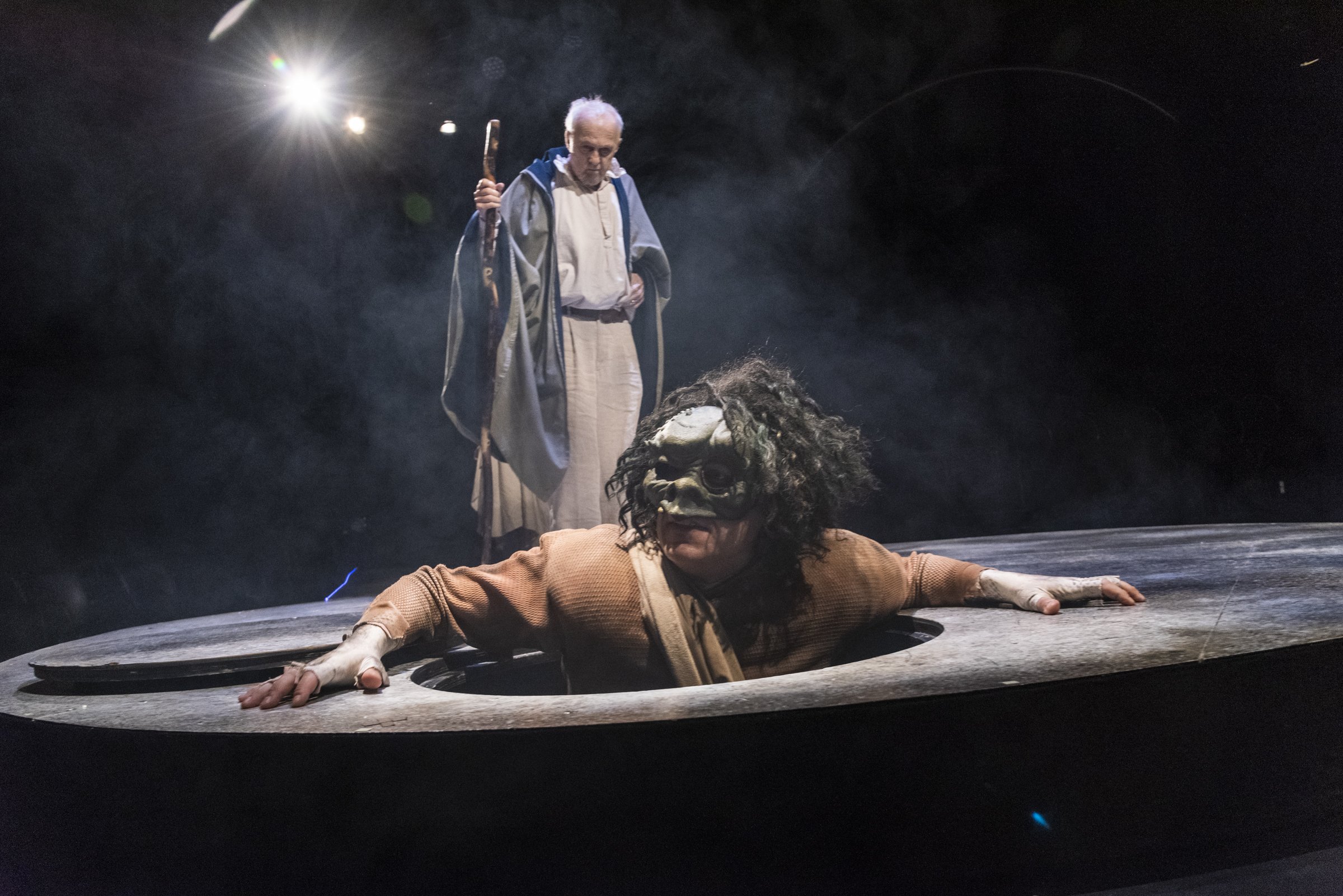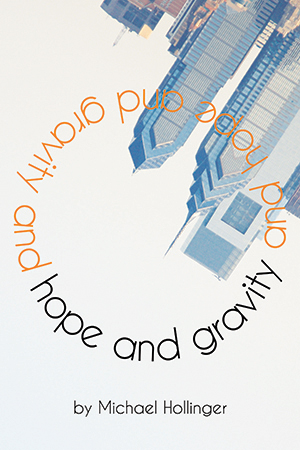Shakespeare was a racist. How could he avoid it? He was a white, protestant, European male living at the end of the 16th century, during a rise in global colonization. He was also a feminist and a progressive, and a humanist, and an advocate for minorities, and cross-dressing, and the conjugal affiliations of fairies and mules. I mean, right?
Myself as “Caliban” with Lawrence Pressman as “Prospero” in THE TEMPEST at Quintessence Theatre Group. Photo by Linda Johnson
Or maybe he was none of these things. Maybe he was just a writer trying to write successful plays that made money and earned him a decent living, and he was willing to pander to the proclivities of his audience to achieve that end. Or sometimes to subvert those same proclivities for the same purpose. I don’t know. I’ll probably never know.
Either way, it must be admitted there are plenty of sticky, complicated bits inside that 400-year-old cannon. Sometimes those complications are intentional. Sometimes they are the awkward residue of 400-year-old social biases. I can’t solve all those problems. I probably can’t even solve one, but I’m going to ponder the problem of Caliban in THE TEMPEST here, anyway. I’ve just completed a run as the character at Quintessence Theatre Group here in Philadelphia, so it’s been on my mind.
Now, THE TEMPEST isn’t specifically about colonialism and slavery – it’s much more concerned with revenge and redemption – but it’s also not NOT about colonialism and slavery. If you’re unfamiliar with the play, Prospero – our protagonist – is the ousted, former duke of Milan who, twelve years before, barely escaped with his life and his daughter on a tiny boat and was shipwrecked on an island in the Mediterranean Sea. They then survive on that island with the generous aid of that island’s mostly magical, indigenous inhabitants until a boat full of his enemies happens to sail nearby. Prospero then summons a magical tempest to shipwreck their boat and bring the lot ashore.
But, wait, did I say the natives of the island give their “generous aid”? Nope, nope, that ain’t exactly it, is it? He finds Ariel, a supernatural sprite with impressive magical powers who is painfully spellbound in a tree, and “frees” him… so that in return, Ariel will become Prospero’s indentured servant, obligated to fulfill that office for an indefinite amount of time as Prospero sees fit. Ariel and Prospero do seem to generally get along and like each other, so I guess, that’s that.
But if Ariel serves contentedly, Caliban seethes with contempt. Originally grateful for the neighbors on his island home, and eager to help in exchange for sugar water and the attentions of Prospero’s daughter Miranda, things go south when Caliban’s attentions for Miranda turn sexual. But instead of simply banishing Caliban from their portion of the island, Prospero instead imprisons him in a rock cave near their camp, and forces him to continue his labors for their well-being; foraging for their food and fresh water and firewood, and any other task for which Caliban’s massive physical strength might seem useful.
And that, of course, is a form of colonialism and slavery. Prospero, indeed, refers to Caliban multiple times as “my slave.” He and Miranda both do, and they attach negative modifiers to insult him and express their dislike of him. And that’s the sticky part. Insulting enslaved persons by way of their enslavement is “punching down” in a really big way.
Some 21st century theatre makers, in an effort to demonstrate more sensitivity, now make the choice to remove the words “slave” and “slavery” from their productions of THE TEMPEST. Perhaps this is the correct choice. Among the insults levied by Prospero and Miranda: “Poisonous Slave,” “most lying slave,” and “abhorred slave,” all of which they speak directly to Caliban during his first appearance of the play in Act One, Scene Two.
Now, I strongly advocate trying to address any language that uses otherness, or darkness, or (in this case) slavery as an equation for degradation or undesirability. For example, during the act three “lover’s quarrel” in A MIDSUMMER NIGHT’S DREAM, Lysander howls at Hermia, “Away, you Ethiope!” comparing her to a dark-skinned African as a way of declaring his disgust for her. Implicit in the comment is that Ethiopians are lesser beings - and it’s presented as a joke. Not okay. So, yes, address that problem, and cut the line, or change the word! (Hot tip: using “artichoke” still scans and probably has a better chance of actually being funny, anyway!)
Caliban’s portrayal in THE TEMPEST, though, is quite different. His slavery is very real. It’s literally what he is. Your production can choose to lean into, or away from, how much he might deserve to be in his condition, but the fact of it is still undeniable. Caliban is Prospero and Miranda’s indentured servant. Their Enslaved Person. Full Stop.
Further, it’s not just incidental background data, it is integral to Caliban’s entire subplot. He will soon encounter Trinculo and Stephano wandering about the island (having also survived the shipwreck) and immediately enlist them in a plot to overthrow his slave master, Prospero, by murdering him and installing Stephano as the new master of the island. So, yes, you can remove the word “slave” from the play, but you cannot remove the slavery.
In total, Prospero and Miranda refer to Caliban as a “Slave” six different times in the play, and five of those are directly to Caliban. If you want to go that route, six words aren’t hard to change or remove, right? But consider that the script is also overflowing with other words and phrases which debase Caliban’s humanity and equate him to an lower order of animal.
Caliban is called a “Monster” 44 times in the text, again with the word often paired with a more degrading modifier (shallow, scurvy, ridiculous, abominable, and more). He is repeatedly referred to as a dog, then a fish, a moon-calf and a devil. Even his mother is called his “dam” which is, at its core, an allusion to chickens laying eggs. And the vast majority of these degrading terms are spoken directly to Caliban.
Caliban’s actual name is spoken by the other characters nine times in the play, but only once when speaking directly to him, and that is only when Prospero is first ordering Caliban to come out of his hole in act one. Caliban refers to himself by name on three different occasions. Two of those self-referrals occur while he is in the presence of Stephano and Trinculo, so they, like Prospero, are certainly aware of what his name actually is, but neither character uses Caliban’s real name even once in the play, and keep in mind they share every moment of their stage time with him. By contrast, Stephano and Trinculo refer to each other by given name 28 different times.
So, if the de-humanizing and derogatory language is inescapable, and the narrative fact of Caliban’s slavery is unavoidable, then stop and consider who we might be protecting by taking the word “slave” out of Prospero and Miranda’s mouths. Is it to protect Caliban – and anyone who might feel a generational connection to his enslavement? Or, does it protect the heroes of our story from shamefully expressing their own classism or racism?
Thomas Jefferson, the man who wrote the words, “All men are created equal,” owned people. He fathered children by an enslaved woman who he owned. These are facts. Yet, there are conservative elements of our society who are actively working to suppress, or white-wash, these facts. If those efforts succeed, it only reinforces the propaganda suggesting that racism is not currently a problem in this country. This is only one example.
So, how do you honor Caliban and the people he might resemble? By erasing a word and possibly obscuring his truth? Or by allowing his master to speak the quiet part out loud? By allowing Prospero to be complicated? By allowing the audience to consider that difficult truth? What if that’s what Shakespeare intended in the first place? OR, maybe he didn’t intend it, but it’s just the complicated residue of his own inherent racism filtering into his text, and what if that in itself deserves to be examined?
Again, I am not suggesting that I know what the correct answer is. The choice you might make will certainly be affected by multiple factors. And Shakespeare’s plays are textured with so many truths - whether intentional or inherent - that it is often possible to explore them from any angle you might choose, or not at all. At the least, take the time to weigh all the options, and make a fully informed choice, because someone later will ask you why, and they’ll be listening very carefully to your reply.












